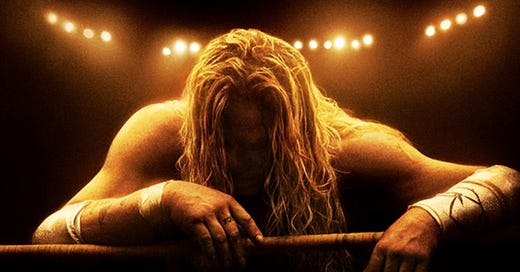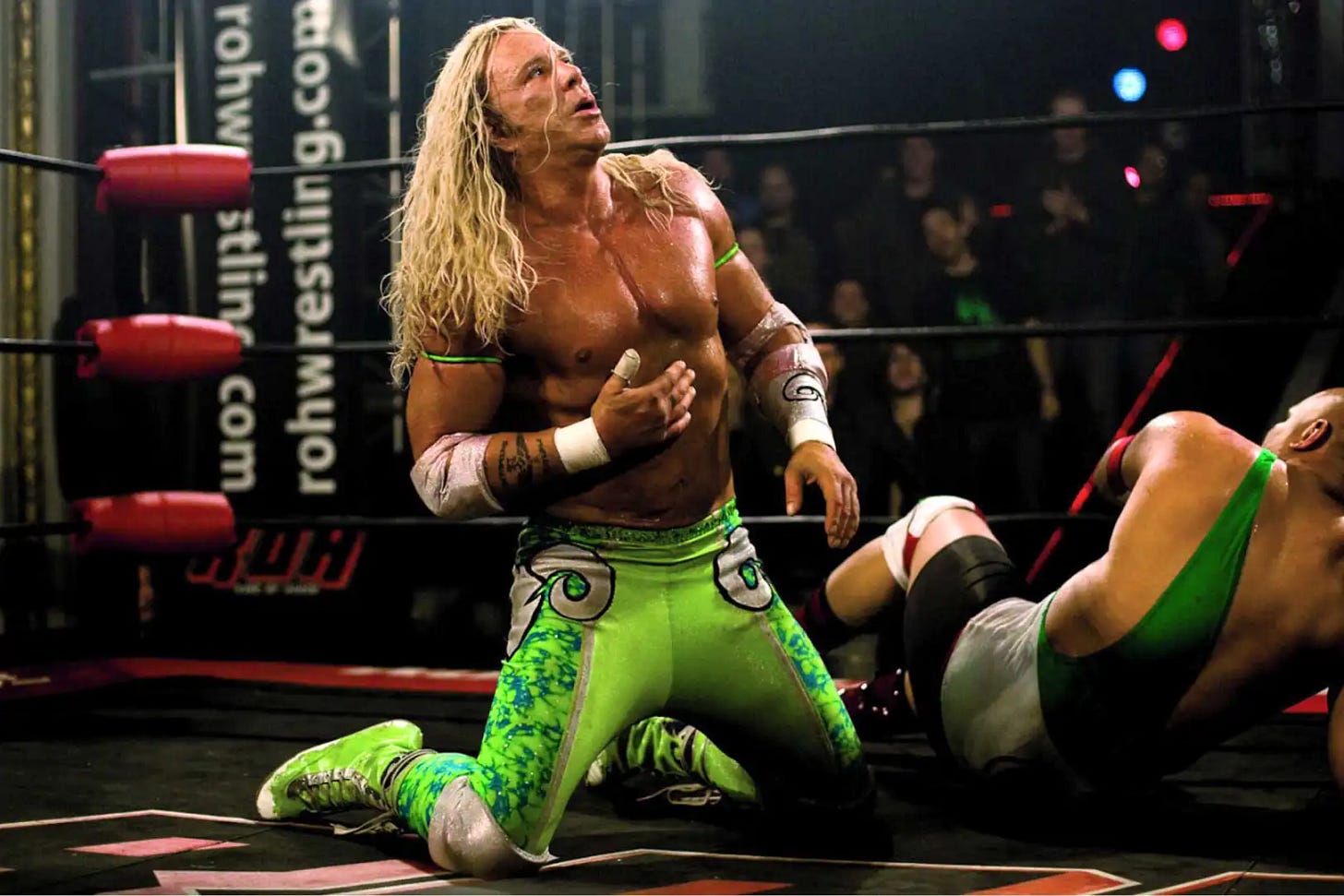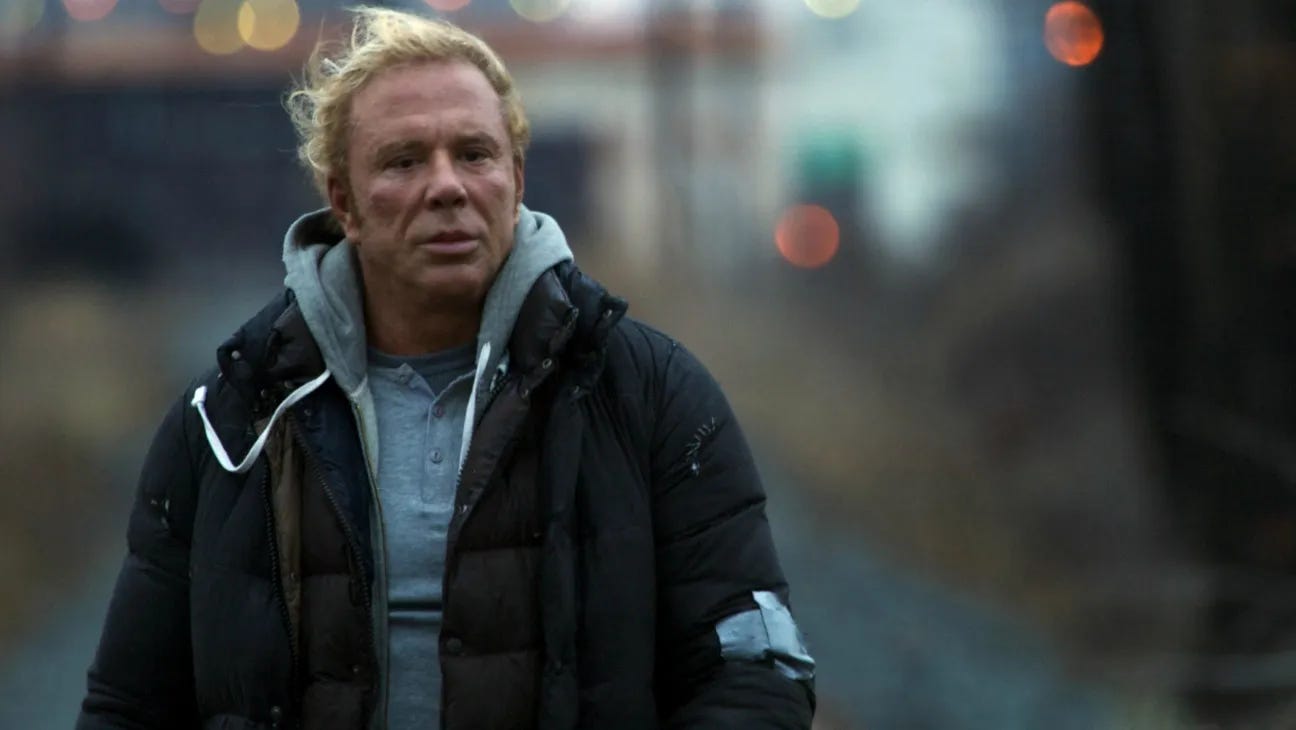The Wrestler is a 2008 film directed by Darren Aronofsky about Robin Ramzinski, who goes by his ring name Randy ‘The Ram’ Robinson, a former wrestling superstar from the ‘80s whose best days are long behind him. Randy (played by Mickey Rourke) is now on the independent circuit where he performs to small crowds predominantly in New Jersey. He battles declining health, poverty and diminishing real-world prospects throughout the movie, as he struggles to reconcile the various competing parts of his life. The Wrestler is a good movie and you needn’t be a fan of wrestling to appreciate it. The film is, however, a heavy dose of realism without any feelgood factor or happy ending.
Randy lives in a trailer, works at the local supermarket and visits a strip club regularly. You get the impression that hope turned to desperation a long time ago and that he has been struggling for years, living off the fading memory of past glories. He meets Cassidy (played by Marisa Tomei), a stripper whose career parallels Randy’s in many ways. However, his romantic advances are rejected. An extreme wrestling contest leads to Randy being hospitalised after having a heart attack but after some soul searching conversations with Cassidy, he gradually starts to become more considerate and responsible: he vows to give up wrestling and prioritise his health, he starts to repair his broken relationship with his estranged daughter and begins taking on more hours at his day job. But he soon descends down a road more travelled. After a hedonistic night fuelled by drugs, drink and sex, Randy forgets his appointment with his daughter which leads to a violent argument between the two, he then quits his job after a self-inflicted injury at work. Randy re-enters the ring and looks to relive his glory days in a match with a wrestler called “the Ayatollah”, as the story reaches its climax Randy ends up back where the film began, in the wresting ring.
What is interesting about this movie is that, yes, on one level it is about wrestling but on another it is about much more. The movie is about dispossession, it’s a movie about desperation, poverty, decline and denial.
Randy’s greatest battle does not take place inside the wrestling ring but rather outside of it. He struggles with the world around him on a daily basis, from work and relationships to his ailing health and finances. But if anything, Randy’s greatest battle is against an opponent he will likely never conquer – himself! His life has steadily been ruined by old age, steroids, injuries and poverty. Small things say a lot about Randy; his hearing aide, his bandages and his reliance on pay phones serve as constant reminders of where he is in life. But wrestling is all he knows; he has nothing else but his denial simply prolongs the struggle.
His one outlet comes in the form of Cassidy, she works at a local strip club that Randy regularly patronises. Cassidy and Randy are reflections of one another: Cassidy simulates sex for a living and Randy simulates violence for a living. Both perform under pseudonyms and both are past their prime. But unlike Randy, Cassidy is more in touch with reality and the world around her. Generally speaking, when she isn’t at the strip club, she is responsible and makes good decisions, keeping a firm boundary between her personal and professional life and making sure her two boys are kept in line. Importantly, she has a somewhat loose plan to leave the strip club and relocate elsewhere. With Cassidy, you get the impression that she has learnt from her mistakes but the same cannot be said about Randy.
Randy is like many men; he means well but his passions often get the better of him. Randy does not do bad things per se but he is short-sighted, ill-tempered and impulsive. Reason is in short supply because he doesn’t come from a world based on reason. His occupation, wrestling, does not rely on reason or prudence but is one largely predicated on youth, good health and physicality, all of which are declining in his case.
There is much to ponder on in this film.
The one real moment of connection and humanity for Randy comes with his daughter, Stephanie. After giving her a present, they embrace and then go on a long walk revisiting some old places from their past. They dance and hug, laugh and smile and after Randy says tearfully to her, ”I deserve to be all alone, I just don’t want you to hate me”, a line that stuck with me till the end, l must confess.
One thing that does stand out to me is how Randy’s past is left somewhat unchecked. No clues are left as to whether he was married or not, where Stephanie’s mother is or what became of her. Aronofsky leaves the audience to fill in the blanks.
But Randy soon succumbs to the forbidden fruit: a night of sex, drugs and alcohol leads to him missing his dinner appointment with Stephanie and a violent argument with his daughter ensues. Things soon take a turn for the worse, the argument with his daughter precedes the bloody, messy injury at work all culminating in Randy desperately trying to get back into the ring. Randy’s life has, once again, spiralled out of control, l say ‘again’ because there is a foreboding sense that he has been here before.
The scene in the supermarket is very symbolic in that it parallels his life up to that point; the injury is self-inflicted, it leads to a violent outburst and to him quitting his job. Throughout the film, Randy is the victim of his own bad choices and decisions and you can’t help but feel sorry for the man.
Wrestling does deserve at least some mention. The production team have deliberately set up the camera and audio equipment in the ring to capture the wrestling contests in their rawest, truest form (in professional wrestling, this same equipment is set up outside and around the ring) showing the reality of wrestling from the wrestlers’ point of view. Randy comes from an era that spurned many household names, many of whom would go on to die prematurely and The Wrestler seems to be a nod in this direction, on some level anyway.
In the final scene, Randy goes to participate in his rematch with “the Ayatollah”. “The Ayatollah”, whose real name is Bob, contrasts heavily with Randy: Bob, now a used car salesman, has obviously moved on from his wrestling days and is clearly the healthier of the two. Bob makes a mockery of the business with his, ‘I’m the heel and you’re the face – done!’ line, seemingly more preoccupied with making a sale than the match ahead of him.
Cassidy heads out to the venue to find Randy. As she enters the arena, it is a role reversal of sorts as she is watching him perform for the first time. Before heading out for his match, Randy utters one of the most memorable lines of the movie, “The only place l get hurt is out there, the world don’t give a shit about me.” In a highly symbolic moment, he then walks away from Cassidy and towards the ring.
In the final scene, Randy looks up and sees that Cassidy has disappeared, like so many people in Randy’s life. As the film climaxes, his pride and wrestling are all that remain.






